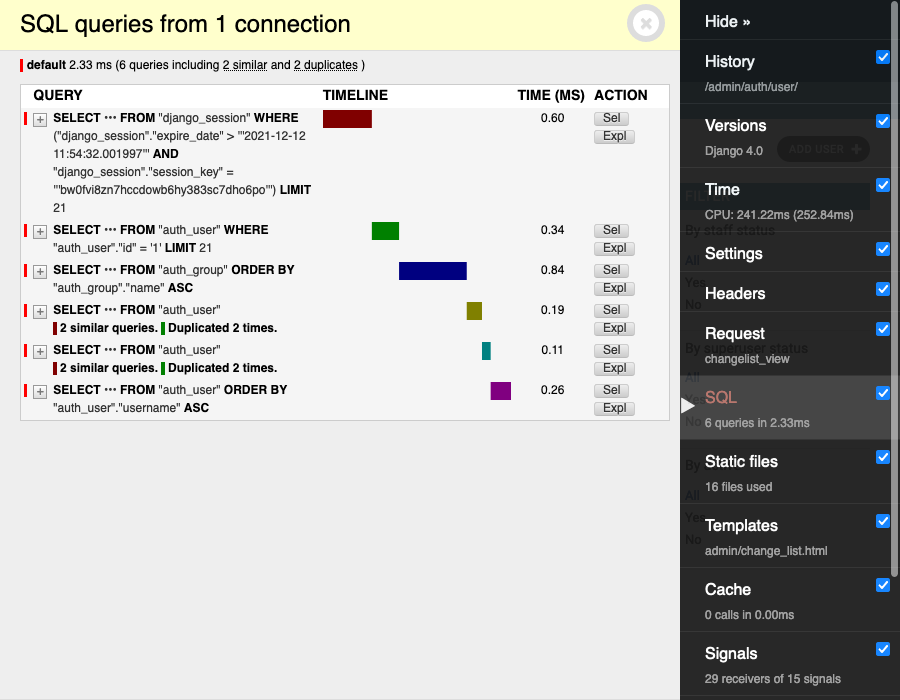article:
Enhance Your Django Development with Django Debug Toolbar
Are you a Django developer looking for a powerful tool to improve your development process and optimize the performance of your web applications? Look no further than Django Debug Toolbar! With its configurable set of panels, Django Debug Toolbar provides detailed debugging information about the current request/response, allowing you to identify and resolve issues quickly.
What is Django Debug Toolbar?
Django Debug Toolbar is a popular open-source library that offers a comprehensive set of panels. These panels display essential debug information about the current request/response. By clicking on a specific panel, you can access more detailed information about its content.

In addition to the built-in panels, the Django Debug Toolbar community has contributed several third-party panels, offering even more functionality and insights.
Key Features and Benefits
Django Debug Toolbar has several unique features that make it an indispensable tool for Django developers:
-
Detailed Debug Information: The toolbar provides comprehensive information about the request/response, including SQL queries, cache usage, template rendering times, and more. This allows you to pinpoint performance bottlenecks and optimize your code accordingly.
-
Configurable Panels: You can customize which panels are displayed based on your specific debugging needs. This flexibility enables you to focus on the most relevant information for your current development tasks.
-
Compatibility: Django Debug Toolbar is compatible with Django versions 3.2.4 and above, providing support for the latest Django features and functionalities.
How Does Django Debug Toolbar Improve Django Development?
Django Debug Toolbar offers several benefits that enhance the Django development process:
-
Rapid Issue Resolution: With detailed debugging information readily available, you can quickly identify and resolve issues, reducing development time and effort.
-
Performance Optimization: By analyzing the SQL queries, template rendering times, and cache usage, you can fine-tune your code to improve performance and overall user experience.
-
Efficient Development Workflow: The toolbar’s panels simplify the debugging process, allowing you to focus on critical areas of your codebase. This ensures a smooth and efficient development workflow.
Competitive Analysis
Django Debug Toolbar stands out among other debugging tools in the market due to its robust feature set, ease of use, and active community support. While there are other debugging solutions available, such as the Django Silk and Django DevServer, Django Debug Toolbar offers a comprehensive package with advanced features and a user-friendly interface.
Go-To-Market Strategy
To bring Django Debug Toolbar to market effectively, a robust go-to-market strategy is crucial. The following steps should be considered:
-
Target Audience: Django Debug Toolbar is primarily tailored for Django developers aiming to boost their debugging capabilities and optimize the performance of their web applications.
-
Launch Plans: Plan a high-impact launch by engaging with the Django community through blog posts, social media announcements, and developer conferences. Collaborate with influencers who can endorse the product and organize webinars to showcase its features.
-
Marketing Channels: Leverage online platforms frequented by Django developers, such as Django community forums, Reddit, and popular developer blogs. Create informative video tutorials and case studies to demonstrate the value of Django Debug Toolbar.
-
Distribution Channels: Offer the Django Debug Toolbar as a downloadable package on popular package managers like PyPI and provide clear installation instructions on the official website. Additionally, integrate the tool with popular Django development frameworks and provide seamless integration options for developers.
User Feedback and Roadmap
Django Debug Toolbar has been refined over the years based on user feedback and testing. The active community support ensures regular updates and bug fixes to address user issues and improve functionality. The roadmap for Django Debug Toolbar includes the development of new panels, integration with emerging Django features, and increased compatibility with future Django versions.
Conclusion
Django Debug Toolbar is an invaluable tool for Django developers, offering comprehensive debugging capabilities and performance optimization features. With its configurable panels and detailed debug information, Django Debug Toolbar empowers developers to resolve issues quickly and improve the overall quality and performance of their web applications.
Prepare to enhance your Django development workflow by integrating Django Debug Toolbar into your projects. Stay tuned for the latest updates, upcoming panel releases, and even more extended functionality. Welcome to the world of efficient debugging and optimized Django development!
Leave a Reply